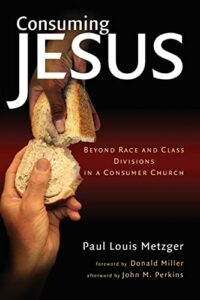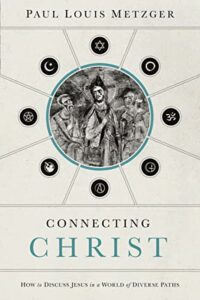 More Than Things: A Personalist Ethics for a Throwaway Culture Paul Louis Metzger (IVP Academic) $48.00 // OUR SALE PRICE = $38.00
More Than Things: A Personalist Ethics for a Throwaway Culture Paul Louis Metzger (IVP Academic) $48.00 // OUR SALE PRICE = $38.00
We want to invite you to consider this seriously academic treatise; we have it early so you can buy it now at our sale price.
YOU CAN EASILY ORDER BY CLICKING THE LINK BELOW WHICH TAKES YOU TO OUR SECURE ORDER FORM AT THE HEARTS & MINDS WEBSITE. WE WILL ACKNOWLEDGE YOUR ORDER PERSONALLY. Yep, personally.
Also, we invite you to join us in a very special on-line celebration of the book and the author that we will offer next month, the afternoon of THURSDAY, August 17, 2023 at 1:00 EST. Stay tuned for future info about how to join (for free) this very special on-line, live-streamed book launch event.
We will advertise more about this opportunity to meet Dr. Paul Metzger as I interview him about this remarkable new book, but for now, we wanted you to know that Hearts & Minds has More Than Things in stock and we are sending them out at our BookNotes discounted price (a little bit more than 20% off.) It is a major and necessarily complicated book and I want to tell you a bit about it, and share how honored we feel to be able to promote it — at the shop in Dallastown, PA and here through our mail order biz, and at that upcoming Facebook live-type book event on August 17th.
We have long admired Paul Metzger, a philosopher (with a PhD from the prestigious King’s College, London) and professor of the theology of culture at Multnomah University and Seminary. He also directs the Institute for Cultural Engagement, there, popularly known as “New Wine, New Wineskins.” Hooray for that!
 We enthusiastically reviewed and continue to take to events where we are selling books his 2011 release, New Wine Tastings: Theological Essays of Cultural Engagement (Cascade Books; $21.00 – OUR SALE PRICE = $16.80) when it came out because it captured much of our overall theme of cultural engagement, learning how, as Christians, we can be involved in but not absorbed by, our surrounding secularized culture. In that nice collection he explores First Nations issues, questions of finding Christ among the homeless, climate change, and more foundational themes, like resisting the culture wars, not living in a “Christian ghetto”, and a generative chapter called “Toward a Theologically Conservative, Compassionately Liberal Faith.” You can imagine we like it. We are fans of his work.
We enthusiastically reviewed and continue to take to events where we are selling books his 2011 release, New Wine Tastings: Theological Essays of Cultural Engagement (Cascade Books; $21.00 – OUR SALE PRICE = $16.80) when it came out because it captured much of our overall theme of cultural engagement, learning how, as Christians, we can be involved in but not absorbed by, our surrounding secularized culture. In that nice collection he explores First Nations issues, questions of finding Christ among the homeless, climate change, and more foundational themes, like resisting the culture wars, not living in a “Christian ghetto”, and a generative chapter called “Toward a Theologically Conservative, Compassionately Liberal Faith.” You can imagine we like it. We are fans of his work.
I do not say this to scare you away, but, well, this new one, More Than Things: A Personalist Ethics for a Throwaway Culture, is fairly expensive and a thick volume. It’s over 450 pages! I don’t often celebrate philosophy books here at BookNotes, even if we have a fairly robust and, I’m told, interesting, philosophy section, with some standard old stuff and personal favorites from Herman Dooyeweerd to Alasdair MacIntyre to Jamie Smith to Esther Meek (see her brand new one, by the way — Doorway to Artistry: Attuning Your Philosophy to Enhance Your Creativity (Cascade Books; $32.00 – OUR SALE PRICE = $25.60.)) But I digress: this new Metzger work is scholarly but not exactly a philosophy book, per se. It’s not standard theology, either: perhaps we can call it applied social ethics rooted in a philosophical public theology. It’s hard to explain, but, man, it’s good. And important.
Ron Cole-Turner of Pittsburgh Theological Seminary raves about it, saying it is “sweeping in scope while precise in detail.” Peter Casarella of Duke Divinity School calls More Than Things “an ecumenical tour de force.”
We just got our copies into the store, so we’re eager to send them out now. Let me tell you what my study of an advanced manuscript has revealed. And why we’re thrilled to have a good virtual conversation on social media next month that we hope you can join.
SETTING THE TABLE TO THIS INVITATION
Let me try to set the table just a bit so you see what sort of book I’m inviting you to consider and what the program will be like when I host an online conversation with him in a couple of weeks. We hope you will find the event hospitable and tasty and substantial. I know the book is hearty, to say the least.

First; Paul Louis Metzger. We’re not dear friends or old pals, really, but I’ve respected his work for years. He’s admired Hearts & Minds from afar, so we’re honored that he reached out to us to see how we might work together to get the word out about More Than Things.
You see, the book is about the philosophy of personalism, which sounds like a prophetic voice in the modern wilderness, inviting us to resist the trend that, as it is sometimes cleverly put, treats people like things and things like people. Obviously, any serious ethic for our day has to turn that around. We’ve got to undo some of the process of commodification of nearly everything. Let’s start with why we’re involved with the launch of this important book.
 With that personalist perspective, Metzger doesn’t want to just download the data to Amazon or let some faceless corporation generate algorithmic orders with robotic tech filling “units of sales” (as they call books these days) stuffing them carelessly into boxes speeding down the conveyor belt and out to Sunday delivery without a smile or a prayer. I think it is fair to say that Paul truly wants a more humane and gracious sort of selling experience for his baby — that would be the buying experience for you, friend — so here we are, trying to do old-school mail-order with a smile and as much of a personal touch as we can muster. He knows that for a book promoting a more personal approach to the modern world it makes sense to promote it firstly through businesses he is in relationship with. You can get it at any number of indie bookstores who will care about personalized customer service.
With that personalist perspective, Metzger doesn’t want to just download the data to Amazon or let some faceless corporation generate algorithmic orders with robotic tech filling “units of sales” (as they call books these days) stuffing them carelessly into boxes speeding down the conveyor belt and out to Sunday delivery without a smile or a prayer. I think it is fair to say that Paul truly wants a more humane and gracious sort of selling experience for his baby — that would be the buying experience for you, friend — so here we are, trying to do old-school mail-order with a smile and as much of a personal touch as we can muster. He knows that for a book promoting a more personal approach to the modern world it makes sense to promote it firstly through businesses he is in relationship with. You can get it at any number of indie bookstores who will care about personalized customer service.
And ain’t that an odd redundancy, “personalized” customer service? For anyone who has been on hold for hours on end waiting for some bureaucratic cog to make something right (or not) we might ask, isn’t that what customer service is supposed to be: personal? In our disembodied, efficient world of Amazon transactions, wouldn’t it be nice to be treated like a human?
This, in a nutshell, speaks of Metzger’s integrity and joy in doing this publishing thing. The marketing departments of the publishers of the world may tell him to go to Amazon first and many authors (even friends) hype the Babylonian captivity of their imagination with exclusive links right to the belly of the beast, but he knows better. And we are grateful; so grateful that we are putting our own money where our mouths are, and getting behind this big study of why in God’s sad world, redemptive healing just might come through a philosophical and strategic shift towards personalism. It’s a long, heavy work, but the point is exemplified plainly. Let’s work at a human scale, resisting what Postman called technopoly, and not treat people like things. We once had a marketing slogan where we invited folks to “come be more than a customer.” I think that’s what we meant, somewhat inefficient as it may be. You can imagine that we are thrilled to champion this book.
Personalism is more, though, than a worldview that values human decency and slow, personal care. It is more than a simple “love your neighbor” approach, although one might reasonably think it is mostly that. But, as philosophical works do, the thesis is teased out and explored, compared and contrasted with other systems, constructs, practices. It is carefully argued with exquisite, exceptional detail.
Dr. Metzger is extraordinary at doing just this and it is one of the reasons More Than Things is not merely a sweet spiritual reminder to be humane and kindly. It is a major ethics text and could be called ground-breaking and pioneering; it certainly is theologically audacious. The book offers a world-shaking paradigm shift, rooted in what might be called a visionary metaphysics. I’m not kidding. He uses the “M” word in the subtitle of chapter two — which is on faith, hope and love, actually — offering “Metaphysical and Methodological Conditions for a Personalist Moral Vision.” Metaphysical and Methodological! Yep, it’s that kind of book. You’re going to have to take it slow.
The book, as they say, gets into the weeds. There are profound and lengthy explorations of the implications of personalism in several areas of life and thinking. For instance, there are hefty chapters that go into fastidious detail explaining the uniqueness that a personalist view would bring to topics such as being consistently pro-life, wondering about our lust for genetic perfection (and the value of imperfect bodies), exploring sexuality and marital pleasure; More Than Things proposes ways that personalism might help us live out an “imperative for equality” in our world of gender inequality. He looks at topics as complex as physician assisted suicide and immigration reform and, in a truly exceptional study, modern warfare, specifically, drone targeting. How does a tenderly-imagined, Christian personalism offer a philosophical compass for thinking about market ideology and creation care and even space exploration? This book will keep you thinking and talking and praying and seeking grace to become people enabled to live out a consistent Christian ethic for a very long time.
 Many years ago Metzger wrote a book called Consuming Jesus: Beyond Race and Class Decisions in a Consumer Church (Eerdmans; now $27.50 — OUR SPECIAL SALE PRICE – $17.00.) We still have some (at the older price) because we really believed in that book. It had a cool Foreword by then-bohemian, then rather anti-capitalist writer Donald Miller and a strong Afterword by the great, black evangelical leader John Perkins. It made the case that a worldview which enshrines consumer preference will, naturally, erode higher and more important ecclesiastical requirements, keeping us stuck in that situation that Martin Luther King called out when he noted that 10:00 o’clock Sunday morning was America’s most segregated hour.
Many years ago Metzger wrote a book called Consuming Jesus: Beyond Race and Class Decisions in a Consumer Church (Eerdmans; now $27.50 — OUR SPECIAL SALE PRICE – $17.00.) We still have some (at the older price) because we really believed in that book. It had a cool Foreword by then-bohemian, then rather anti-capitalist writer Donald Miller and a strong Afterword by the great, black evangelical leader John Perkins. It made the case that a worldview which enshrines consumer preference will, naturally, erode higher and more important ecclesiastical requirements, keeping us stuck in that situation that Martin Luther King called out when he noted that 10:00 o’clock Sunday morning was America’s most segregated hour.
I do not know anybody who has related our cultural ideology/idolatry of consumerism to racial justice and class issues, let alone grounded it in a robust theology of the church.
Listen to William Storrar then the Director of Princeton’s Center of Theological Inquiry, about Consuming Jesus:
Paul Metzger is a prophetic voice in the American evangelical community. His theological vision of a church consumed by Christ and not by consumerism could not be more timely or helpful. Writing with scholarly depth and human empathy, he exposes the consumerist roots of racial and economic divisions in the body of Christ and shows how faithfulness to the gospel leads to a reconciled evangelical community and witness.
I note this older (and still exceptionally relevant) book to point out that Paul’s early reflections on the ethics of public theology regarding racial diversity and multi-ethnic ministry and class divisions were already, then, pointing to a deeper analysis of the problem and a broader application of Biblical teaching. That book, in retrospect, had the seeds of his stunning racial justice chapter in More Than Things, which, again, is very strong, if scholarly. He explores the use of power, as well (as you might expect) and links his own 21st century ruminations with Dr. MLK’s own personalism. It was King’s preferred philosophical orientation, you know.
Neither King nor other personalists applied this deeply Christian philosophy to so many topics as does the tireless Dr. Metzger. From our throw-away culture that reduces the dignity of the harmed or hurting to our fetish of consumerism that leads to abuse of the creation to our understandings of borders and belonging (you’ve got to read how personalism interrogates meritocracy and offers an ethics of true hospitality for immigrants), from questions about abortion and euthanasia to vegetarianism to questions about the just war theory to our broken modern healthcare systems to genetic engineering and sexual ethics, Metzger takes us on quite a journey.
Interesting enough, More Than Things: A Personalist Ethics for a Throwaway Culture in fact uses the metaphor of a journey. He invites us on the road, and invites us (as we seek flourishing in our pluralistic society) to use the notion of personalism as a compass. Others have used this talk of compasses and true North casually at the start of a book, but for this one, it is serious and nicely helpful. It’s a fairly long and complicated journey and at least this reader needed a steady compass pointing the way. As circuitous as the pilgrimage may be, Metzger is a good guide, offering clear light as we go, step by step, there for the reader, especially at critical junctures.
In his good chapter on creation care, he cites Martin King’s famous “Letter from a Birmingham Jail” and the good line about our “inescapable network of mutuality” which he suggests points to “life as a sacred ecosystem.” He brings in William James Jennings and womanist Delores Williams, in conversation with Moltmann’s God In Creation and Pope Francis’s Laudato Si. I suspect the manuscript was mostly done before the release of Norman Wirzba’s magisterial This Sacred Life: Humanity’s Place in a Wounded World (Cambridge University Press; $28.99 – OUR SALE PRICE = $23.19) and last year’s Agrarian Spirit: Cultivating Faith, Community, and the Land (University of Notre Dame Press; $29.00 – OUR SALE PRICE = $23.20) but I missed the Duke professor and localist farmer as a conversation partner. I gather that Wirzba, even if not quite a personalist, comes close.
This leads to another encouragement to buy this big volume and work with it for a year — it is not (as you might think if you’ve even ever heard of the moral ethic of personalism) the same as anarchism or a pious sort of individualism. It is not unaware that persons are always situated in contexts, shaped by stories and values and embedded in political and economic systems. He serves the poor as Dorothy Day did, it seems clear, but is not opposed to debating public policy and invoking the role of the government, jurisprudence, law, and cultural institutions. There are devout Catholic Workers who, in the spirit of dear Dorothy, want to serve the poor but do not care about government services, do not themselves pay taxes, and are utterly personalistic in a style that evokes the simplicity of Francis of Assisi. This is not the brand of thinking that Metzger is exploring here, even though I kept wondering what Dorothy’s intellectual mentor, the colorful Peter Maurin might have thought. For what it is worth, these are not like his “Easy Essays.” Ha.
I cannot tell you how much I’ve studied this volume and how many lines I’ve underlined. I will note a few random points, which might help you decide if buying this book is worth your time.
I’ll note just three things:
WHAT DOES IT MEAN TO BE HUMAN?
First, much of the first two chapters, which are nearly worth the price of the book, is about the nature of the human; what does it mean we are made in the image of a Triune God? (And why does it seem we’ve lost this truth?) He draws on heavy-weight Christian scholars such as Colin Gunton and Hans Urs von Balthasar and Dietrich Bonhoeffer. While it should be obvious that each human being is unique and full of inherent dignity/worth, so may not be used or abused, it does, indeed, need saying, and saying with rigor. People seem to be MIA, he suggests. Treating people as people is a central, animating notion within personalism, so he circles around to this often, and it is beautiful to behold a serious scholar sharing such a high esteem for humans.
It is not all heady theologians and philosophers, though. He invites us to think of a deeper understanding of the meaning of our God-given human-ness by way of the movies Interstellar and Her. Near the end, in a chapter on the ethics of space exploration Ray Bradbury is discussed next to Michael Gorman and Karl Barth. Who knew Bradbury’s Martian Chronicles has insight about Freud and Darwin? A quote from Neil deGrasse Tyson even brings in Batman v Superman. Paul brings in David Brooks, again, citing his wonderful “Love and Gravity” piece.
There is lots of Biblical study here, too, intensely so, with lots of interaction with interlocutors. In an intentional way this precious and prayerful Christian project takes up the task of being also inter-faith; that is, in our diverse world there is a need to offer a Christian apologetic that works on the world stage and among many worldviews. Without Biblical compromise or theological muddiness, he winsomely offers his call to fidelity to a Biblical personalism in conversation with Buddhist and Muslims, Jews and secularists alike. What a delight to see him explaining how Christian views  compare or contrast with notions, like, for example, karma.
compare or contrast with notions, like, for example, karma.
It might be noted, again, that another of his previous good works set the stage for this. About a decade ago he did a thick, serious volume called Connecting Christ: How to Discuss Jesus in a World of Diverse Paths; it was published by Thomas Nelson ($16.99 – OUR SALE PRICE = $13.59) and is a key book in our section about interfaith conversation. Yes!
BUILDING AND APPLYING CHRISTIAN SMITH’S SEMINAL WORK
Secondly, to help place Metzger’s work just a bit, it might be helpful to link him to the Roman Catholic sociologist Christian Smith. I think it was Andy Crouch who first alerted me to the central importance of Smith’s foundational text What Is a Person? Rethinking Humanity, Social Life, and the Moral Good from the Person Up (University of Chicago Press; $35.00 – no discount on this one.) Somewhat different than his research based books on young adults or shifts in belief or church-goers public lives, this heady tome lays out a critique of modern sociology. As the publisher put it, “Smith argued that sociology had for too long neglected this fundamental question. Prevailing social theories, he wrote, do not adequately “capture our deep subjective experience as persons, crucial dimensions of the richness of our own lived lives, what thinkers in previous ages might have called our ‘souls’ or ‘hearts.’” Smith followed up that important little volume with the 2015 University of Chicago treatise, To Flourish or Destruct: A Personalist Theory of Human Goods, Motivations, Failure, and Evil ($36.00.)
Anyway, I like that Metzger notes that Smith’s work is such a significant contribution to personalist thought and in some ways builds upon it. You might, too.
A GREAT EXAMPLE OF RIGOROUS, DISTINCTIVELY CHRISTIAN SCHOLARSHIP
Thirdly, I might note that, besides all the footnotes, and the many, many names he engages and either shows their strengths or posits his differing view, there is a certain Biblical clarity about things that matter most — Jesus is the Christ, is preeminent over all thing (Colossians 1:18) and is the savior who not only dies an atoning death, and rises in power, but gives his life for the poor and the marginalized. And through it all, this clearly Christian scholar models a very up-to-date, teacherly sort of approach to the biggest issues and important thinkers/movements of the day. He invites us to ask why we believe as we do. (About, for instance, polygamy.) “Why do most Americans still largely find extramarital affairs repugnant”, he asks, in the chapter on marriage, wondering if the disfavor “points to the lingering echo of an ancient divine decrees (or are) vestiges of the essential nature of things, created or evolved?”
He studiously cites secular sociobiologists and situation ethicists and neuroscientists, alongside nuanced discussions of Athanasius and John Calvin and Sarah Coakley. I guess I mean to assure you that this is distinctively Christian scholarship par excellence. Agree or not— heck, understand it all or not — the work is a remarkable witness, a wondrous model for any scholar wanting to integrate their faith perspective with the philosophical movements and thinkers around them and show how the Christian option can be a cultural blessing. Wow.
AND THIS: PERSONAL ANGUISH
I close with a final point: Paul discreetly describes in the forward just a bit about a tragedy in his family; his adult son was in a severe accident, sustaining catastrophic brain injury and is now in need of constant care. Paul speaks to him, and invites others to do likewise, not fully knowing what his son, Christopher, may or may not hear or understand. To minister with such tenderness to a beloved son who cannot not accomplish anything in his current state is a beautiful illustration of the sort of human care that personalism demands. He did not say if this sad event in the life of his family was an impetus for doing the book, if he wrote some of it through tears and gasps, wondering if modern health-care ideologies would make room for honoring the inherent worth of his son in his feeble state. He didn’t really need to, and it is not a testimonial book, but that brief paragraph (and a hint or two elsewhere) remind us how deeply urgent it is to bring an inner reformation to the sciences and a rehabilitation to the practices in various zones of life. From modern warfare to care for the disabled, from immigration policy to attitudes about gender justice, from what we think about abortion to how we honor the hard struggles for racial reconciliation, a personalistic moral framework can help. This is a major ethics text, inviting us to think about the common good, with and for others, in a world that tends to discount and often damage ordinary human people. This stuff really matters.
Even if you think the book is a bit much for your own intellectual capacities these days, do plan to join us for a live-streamed event at 1:00 (Eastern) on Thursday, August 17th for the free event we will host with the help of his publisher, IVP Academic. Stay tuned for more details. We look forward to a good time together — put it on your calendar if you do that sort of thing. We look forward to chatting.

+++
TO PLACE AN ORDER
PLEASE READ, THEN SCROLL DOWN AND CLICK ON THE “ORDER HERE” LINK BELOW.
It is very helpful if you tell us how you prefer us to ship your orders.
The weight and destination of your package varies but you can use this as a quick, general guide:
There are generally two kinds of US Mail options (who just raised their rates again) and, of course, UPS. If necessary, we can do overnight and other expedited methods, too. Just ask.
- United States Postal Service has the option called “Media Mail” which is cheapest but can be a little slower. For one typical book, usually, it’s about $4.12; 2 lbs would be $4.87.
- United States Postal Service has another option called “Priority Mail” which is $8.50, if it fits in a flat-rate envelope. Many children’s books and some Bibles are oversized so that might take the next size up which is $9.20. “Priority Mail” gets much more attention than does “Media Mail” and is often just a few days to anywhere in the US.
- UPS Ground is reliable but varies by weight and distance and may take longer than USPS. We’re happy to figure out your options for you once we know what you want.
If you just want to say “cheapest” that is fine. If you are eager and you don’t want the slowest method, do say so. It really helps us serve you well so let us know. Just saying “US Mail” isn’t helpful because there are those two methods, one cheaper but slower, one more costly but quicker. Which do you prefer?
BookNotes
SPECIAL
DISCOUNT
20% OFF
ALL BOOKS MENTIONED
+++
order here
this takes you to the secure Hearts & Minds order form page
just tell us what you want to order
inquire here
if you have questions or need more information
just ask us what you want to know
Hearts & Minds 234 East Main Street Dallastown PA 17313
read@heartsandmindsbooks.com
717-246-3333
Sadly, as of July 2023 we are still closed for in-store browsing. COVID is not fully over. Since few are reporting their illnesses anymore, it is tricky to know the reality but the best measurement is to check the waste water tables to see the amount of virus in the eco-system. It is bad; worse than it was two years ago, even. It’s important to be aware of how risks we take might effect the public good as those at risk, while not dying from the virus, are experiencing long-term health consequences. (Just check the latest reports of the rise of heart attacks and diabetes among younger adults, caused by Covid.) It is complicated, but we are still closed for in-store browsing due to our commitment to public health (and the safety of our family, staff, and customers.) The vaccination rate here in York County is sadly lower than average. Our store is a bit cramped without top-notch ventilation, so we are trying to be wise.
We will keep you posted about our future plans… we are eager, but delayed, for now.
We are doing our famous curb-side and back yard customer service and can show any number of items to you if you call us from our back parking lot. It’s sort of fun, actually. We are eager to serve and grateful for your patience as we all work to mitigate the pandemic. We are very happy to help, so if you are in the area, do stop by. We love to see old friends and new customers.
Of course, we’re happy to ship books anywhere.
We are here 10:00 – 6:00 EST / Monday – Saturday. Closed on Sunday.

